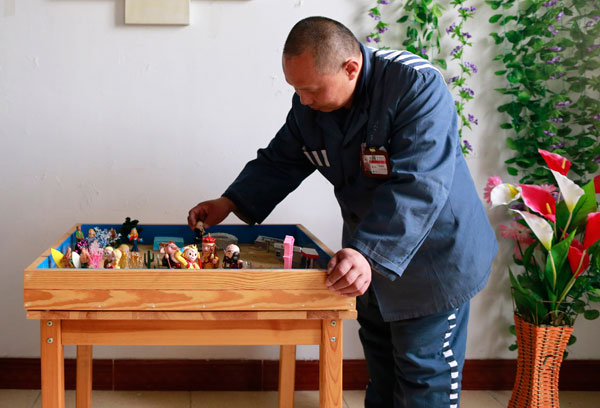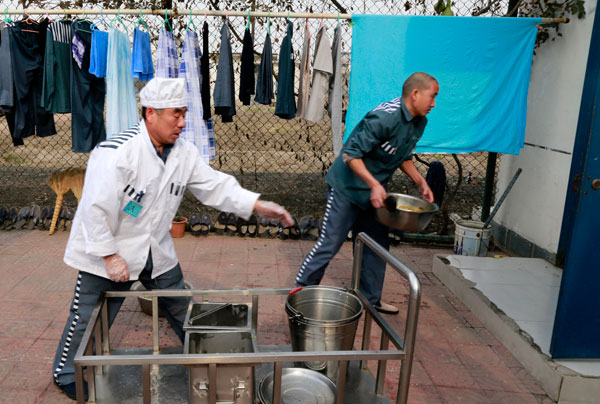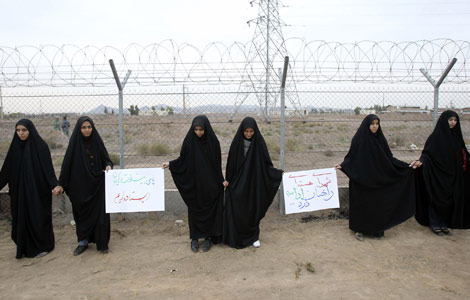A prison where health is the priority
Updated: 2013-11-20 07:27
By Cao Yin (China Daily)
|
||||||||
 |
|
A prisoner uses sandplay therapy to read his own mind at Jin Zhong Prison in Beijing. Feng Yongbin / China Daily |
Xi Meng says he has received two death sentences - one from the court, one from HIV.
The 37-year-old was convicted of homicide in 1998. Seven years into his sentence, he was diagnosed as being HIV positive and moved to Jin Zhong Prison, a facility for inmates with infectious diseases.
"It was hard at first. It felt like my life was shorter than my sentence," said Xi, who is serving a suspended death sentence, which means in 2005 he was facing another decade in prison.
"It was hard to see other prisoners look down on me," he said.
Yet since then, Xi says, medicine and the specialized care he has received at Jin Zhong Prison have been keeping him alive.
The prison, which is under Beijing jurisdiction but is in neighboring Tianjin, was built in 1998 to hold inmates with tuberculosis or hepatitis. A wing for prisoners with HIV and AIDS was added in 2008.
 |
|
Staff send lunch to inmates with HIV and AIDS. Feng Yongbin / China Daily |
"This is different from other prisons," deputy warden Cao Lihua said. "Medical treatment is the priority and core purpose of Jin Zhong."
He said the prison also understands the importance of music and art in treating its more than 1,500 inmates.
More than 280 inmates, including 22 who are classified HIV positive, are serving their sentences in an environment where treatment, both medical and emotional, comes first.
"If convicts get an infectious disease in another prison, they are sent here. If they are cured here, they can return," Cao said.
Inmates can access consultations with doctors from major downtown hospitals, and any whose condition is deteriorating can get treatment in specialist departments, he said.
Xi knows his disease is serious and, upon his release in May, further medicine and treatment will be provided by Beijing Yo'An Hospital.
"It will be hard for me to find a job," he said. "There is prejudice about the disease, but the medical aid has given me great comfort."
Wu Zunyou, director of the National Center for AIDS and Sexually Transmitted Disease Control and Prevention, said separating sick inmates is being explored in other areas, such as Yunnan and Sichuan provinces and the Guangxi Zhuang autonomous region.
"It's a better way to provide professional services and treatment, but it sticks a 'label' on them," he said.
He Jianzhu, who has syphilis. was jailed for killing a man in 2003. He recounted how he was in such bad condition in 2005 that he even wrote farewell letters and applied for euthanasia.
"I could see how shocked people were when they looked at me," he recalled. However, the prison guards did not give up, and they arranged for specialist medical care.
The professionalism and care of Shen Huan, head of the tuberculosis ward, saved his life. He said the correctional officer saw him through the bad times and was there for him.
"No one took as much care of me," He said. "It's because of Shen I'm here today."
Shen, 34, used to work in the only section for healthy inmates, but in 2007 he was dispatched to the sick ward.
"Just a short distance, but it was like going from heaven to hell," he said.
He did not tell his wife until three months later.
"She asked me to apply to be transferred back and became upset," Shen recalled.
Li Fei, a correctional officer in the HIV and AIDS section, said his girlfriend knows about his work, but he conceded he does not mention it to anyone else except close friends.
"I'm grateful for her understanding. There is a lot of discrimination on the outside," he said.
Names of HIV-infected inmates have been changed on request from the prison.
caoyin@chinadaily.com.cn

 Obama, Clintons honor Kennedy's assassination
Obama, Clintons honor Kennedy's assassination
 China urges nations on climate funding
China urges nations on climate funding
 Vice-Premier praises win-win ties
Vice-Premier praises win-win ties
 Hopes rise for accord in nuclear negotiation
Hopes rise for accord in nuclear negotiation
 Rescue team lands in Manila
Rescue team lands in Manila
 SCO meeting to focus on battling terrorism
SCO meeting to focus on battling terrorism
 Obama opens JFK tribute with freedom medals
Obama opens JFK tribute with freedom medals
 Syria's chemical weapons may be destroyed at sea
Syria's chemical weapons may be destroyed at sea
Most Viewed
Editor's Picks

|

|

|

|

|

|
Today's Top News
China confirms visit by US envoy for DPRK
Rice lays out US Asia-Pacific agenda
When should startups think global?
Butterfly Lovers tour concludes in New York
Spokesmen system expands in army
Roadmap 'will curb local debts'
US envoy to China quits job
The supercomputer race has no finish line in sight
US Weekly

|

|






